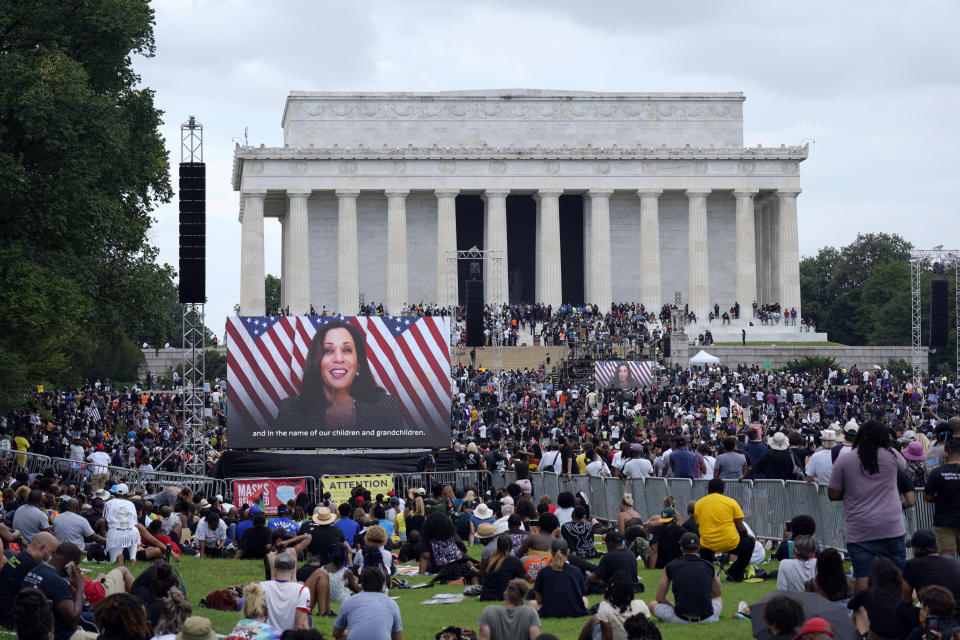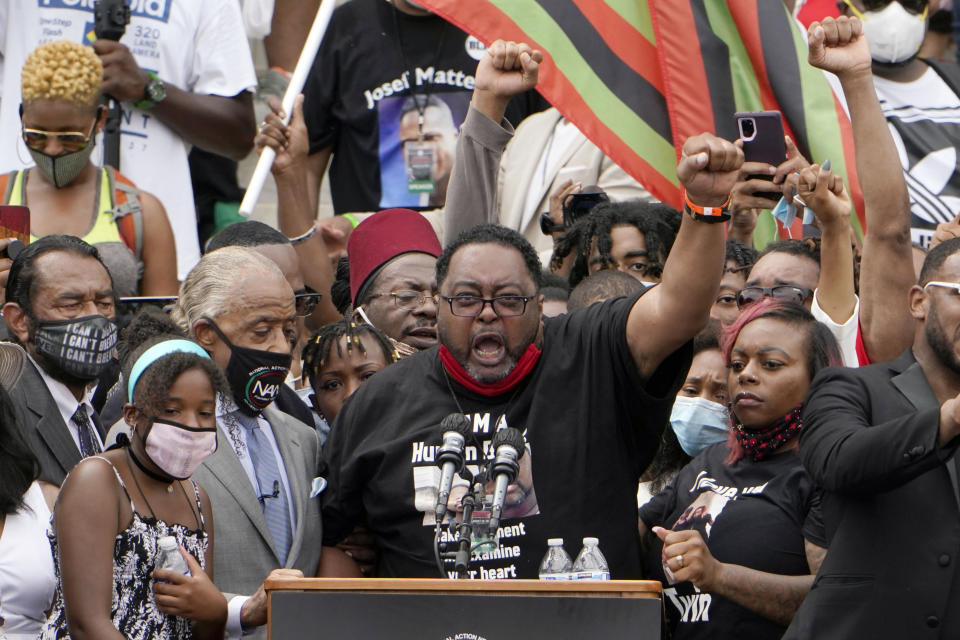Thousands commemorate the March on Washington and push for voting rights, police reform
Amid calls for police reform and stronger voting rights, the Rev. Al Sharpton and other civil rights leaders repeatedly spoke the names of Black men and women killed by police in recent years on Friday and took aim at President Trump at the commemoration of the 57th anniversary of the March on Washington, in which Martin Luther King Jr. delivered his famous “I Have a Dream” speech.
“How do you speak,” Sharpton said in remarks directed at the president that he delivered standing at the Lincoln Memorial, “while this young man Jacob [Blake] lies in a hospital, and you won’t call his name? How do you sit while Breonna Taylor is in a grave, and you won’t call her name? How do you sit while George Floyd is laying in a grave, and you won’t call his name? Well, Mr. Trump, look right down the block from the White House. We’ve come to Washington by the thousands. We’ll never let America forget.”
The families of Taylor, Blake and Floyd joined lawmakers, activists and thousands of attendees, many of whom appeared to be wearing masks, on the National Mall on Friday afternoon for the Commitment March: Get Your Knee Off Our Necks.
Speakers denounced police brutality and voter suppression while urging attendees to vote. Martin Luther King III, the son of Martin Luther King Jr., called on the Senate to “stop blocking passage of the George Floyd Justice in Policing Act and the John Lewis Voting Rights Restoration Act.”
The policing act, introduced in June by Rep. Karen Bass, D-Calif., limits qualified immunity as a civil defense against lawsuits and creates a national police misconduct registry to compile records of misconduct and complaints. It passed the House but has not yet received a vote in the Senate.

The voting bill, named for the late civil rights leader Rep. John Lewis, seeks to restore the protections of the Voting Rights Act of 1965, which was weakened by the U.S. Supreme Court in 2013. Senate Republicans have also stalled the legislation, according to the Hill.
“There is a knee upon the neck of democracy,” King said. “And our nation can only live so long without the oxygen of freedom. The simple challenge before us is that everyone can cast a ballot. And everyone who can must cast a ballot. And that ballot that is cast must be counted. And the result must be transparent and known to the whole world.”
The bills are part of advocates’ push for more accountability for police departments, encouraging participation in the 2020 census and mobilizing voters for the November elections, according to the National Action Network, a civil rights organization that helped organize Friday’s event.
Other actions demanded Friday included a national ban on the use of chokeholds by police and the passage of the Heroes Act, which was introduced in May as a response to the economic crisis caused by the coronavirus pandemic.
Among those who spoke at the rally were Jacob Blake Sr., whose son, Jacob Blake Jr., was shot seven times on Sunday by police in Kenosha, Wis., and remains hospitalized and paralyzed from the waist down. Blake’s shooting sparked several days of protests, some of which escalated into riots, arson and looting.

Blake spoke his son’s name several times Friday and railed against a system he described as racially unjust. “There are two systems of justice in the United States,” he said. “There’s a white system and there’s a Black system. The Black system ain’t doing so well. We are tired, I’m tired of looking at cameras and seeing these young Black and brown people suffer.”
Attendees also heard from Philonise Floyd, the brother of George Floyd, who was killed by Minneapolis police in May. Video showed an officer place his knee on the back of George Floyd’s neck for about eight minutes as he cried out.
Floyd’s death sparked national protests against police brutality.
“I wish George were here to see this,” said his brother.
Thumbnail: Carolyn Kaster/AP
_____
Read more from Yahoo News:
You don't need the U.S. Postal Service to deliver your mail-in ballot
'I trusted them.' Some 'Build the Wall' donors feel cheated by Bannon. Some don't care.
Exclusive: DHS warns of fake election websites potentially tied to criminals, foreign actors
Oleandrin, touted as COVID-19 cure, has no scientific support


